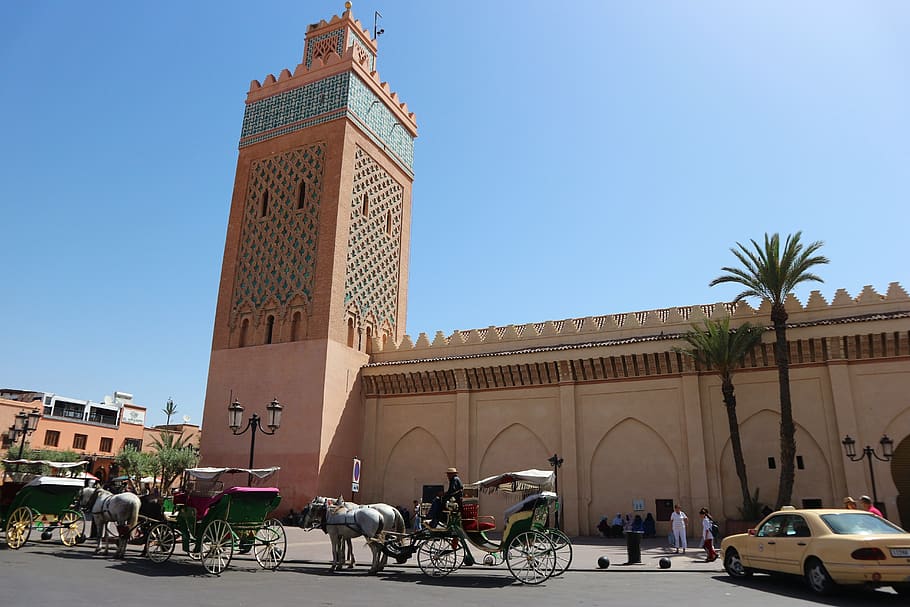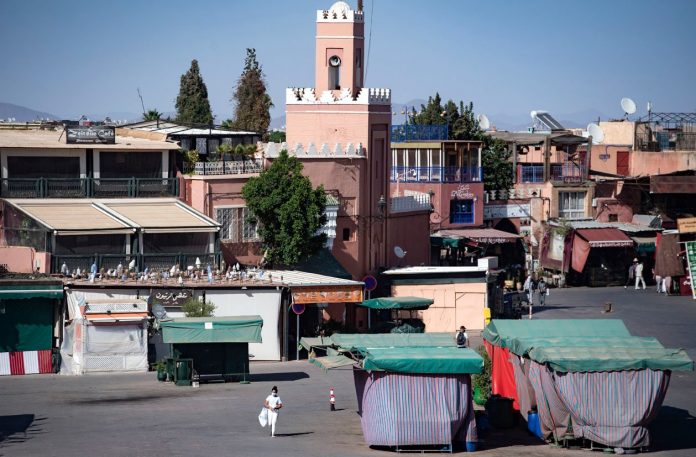Since Morocco closed its borders in the face of the Covid-19 pandemic, the “ochre city” has been idling, to the great displeasure of hoteliers, restaurateurs, guides, craftsmen …
LETTER FROM MOROCCO
Behind the ramparts of Old Marrakech, the storytellers only deliver the tragic tale of an extinct city. “It’s as if a piece of its soul had been torn from it,” one of them describes. “As if the postcard was torn.” The man walks on the large esplanade, head down, mumbling sometimes complaints, sometimes prayers. He is pining for his audience. Of the three million tourists who visit the “ochre city” and its mythical Jemaa-El-Fna square, classified by Unesco, its palm grove, its period hotels, its gardens…
Since Morocco closed its borders in mid-March, “until further notice”, the tourist capital has had a “dead city” feel to it, and locals remember nostalgically the days when they couldn’t park near the vibrant medina and its bustling markets. Today, the scents of spices and stewed meat are no longer present. The gargotes have closed, the carriages are running empty, snake charmers and other monkey tamers are out of work.

“And we’re dying,” says Ahmed, a babouche seller in a shady alleyway with lowered curtains. “Business was going very well last year, but now it’s a tearing apart. “The year 2019 had indeed marked a record year for Moroccan tourism, with 13 million visitors, mainly in Marrakech and Agadir. “Now, we could sell at a loss, begging people to buy the merchandise from us, it would be useless since there is no one,” the 50-year-old laments.
Restricted opening hours
Three months after a drastic containment, the kingdom relied on national tourism to revive this sector which weighs 7% of its gross domestic product (GDP).
In July, restaurants, museums, archaeological sites, and hotels were indeed allowed to open under certain conditions, but, faced with the outbreak of Covid-19, the authorities again imposed restrictions.
With 88,203 cases and 1,614 deaths to date, the country, still in a state of a health emergency, is living at the pace of semi-confinement. Wearing a mask is mandatory, internal movements are subject to exceptional authorizations, and in Casablanca and Marrakech, restricted hours have been imposed on restaurants, cafés, shops, and public parks.
“We did have some local customers, but with the travel restrictions and now the start of the school year, there are not many people left. Normally 90% of our customers come from abroad. Can you imagine the losses that this means for us?”, regrets Daniel Penet, boss of Ciel d’Afrique, which offers hot air balloon flights in Marrakech. Before the crisis, he had between thirty and forty customers a day. “Today, it is thirty per month. “We have a few customers from Casablanca or Rabat, but we had to increase from 200 to 60 seats,” said Mohamed Anaflous, owner of La Trattoria, downtown, which has been loss-making since its reopening in late June.
For a few days now, foreign tourists with a hotel reservation have been allowed to return. The news should have put a smile back on the operators’ faces, but the low frequency of flights, the obligation for travelers to present screening tests dating back less than forty-eight hours, and the vagueness linked to the ban on domestic travel are hampering reservations. “This is not an official opening of the borders. Some tourists may be able to join special flights, but this is limited and not enough to fill out,” explains Kenza Zizi, marketing director at Royal Mansour. So, like most of the city’s major hotels, the palace will remain closed.
“The situation is catastrophic.
The impact of the crisis is expected to be particularly heavy. Morocco is expected to lose at least ten million tourists, according to official estimates. A hard blow for this sector inducing more than two million indirect jobs, especially in Marrakech, which derives most of its income. In addition to hotel and restaurant employees, tourism supports suppliers, guides, craftsmen, cabs, carriage drivers, and thousands of informal workers.
Source: Le Monde

